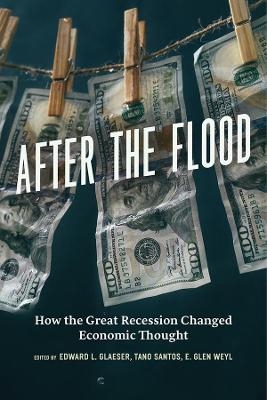
After the Flood
How the Great Recession Changed Economic Thought
Seiten
2017
University of Chicago Press (Verlag)
978-0-226-44354-6 (ISBN)
University of Chicago Press (Verlag)
978-0-226-44354-6 (ISBN)
The past three decades have been characterized by vast change and crises in global financial markets and not in politically unstable countries but in the heart of the developed world, from the Great Recession in the United States to the banking crises in Japan and the Eurozone. As we try to make sense of what caused these crises and how we might reduce risk factors and prevent recurrence, the fields of finance and economics have also seen vast change, as scholars and researchers have advanced their thinking to better respond to the recent crises. A momentous collection of the best recent scholarship, After the Flood illustrates both the scope of the crises' impact on our understanding of global financial markets and the innovative processes whereby scholars have adapted their research to gain a greater understanding of them.
Among the contributors are Jose Scheinkman and Lars Peter Hansen, who bring up to date decades of collaborative research on the mechanisms that tie financial markets to the broader economy; Patrick Bolton, who argues that limiting bankers' pay may be more effective than limiting the activities they can undertake; Edward Glaeser and Bruce Sacerdote, who study the social dynamics of markets; and E. Glen Weyl, who argues that economists are influenced by the incentives their consulting opportunities create.
Among the contributors are Jose Scheinkman and Lars Peter Hansen, who bring up to date decades of collaborative research on the mechanisms that tie financial markets to the broader economy; Patrick Bolton, who argues that limiting bankers' pay may be more effective than limiting the activities they can undertake; Edward Glaeser and Bruce Sacerdote, who study the social dynamics of markets; and E. Glen Weyl, who argues that economists are influenced by the incentives their consulting opportunities create.
Edward L. Glaeser is the Fred and Eleanor Glimp Professor of Economics at Harvard University, where he also directs the Taubman Center for State and Local Government at the John F. Kennedy School of Government and the Rappaport Institute for Greater Boston. Tano Santos is the David L. and Elsie M. Dodd Professor of Finance and codirector of the Heilbrunn Center for Graham and Dodd Investing at Columbia Business School, Columbia University. E. Glen Weyl is a senior researcher at Microsoft Research New York City and a visiting senior research scholar in the Department of Economics at Yale University and at Yale Law School.
| Erscheinungsdatum | 23.04.2017 |
|---|---|
| Sprache | englisch |
| Maße | 16 x 24 mm |
| Gewicht | 567 g |
| Themenwelt | Sonstiges ► Geschenkbücher |
| Geschichte ► Teilgebiete der Geschichte ► Wirtschaftsgeschichte | |
| Wirtschaft ► Allgemeines / Lexika | |
| Wirtschaft ► Betriebswirtschaft / Management ► Finanzierung | |
| ISBN-10 | 0-226-44354-X / 022644354X |
| ISBN-13 | 978-0-226-44354-6 / 9780226443546 |
| Zustand | Neuware |
| Informationen gemäß Produktsicherheitsverordnung (GPSR) | |
| Haben Sie eine Frage zum Produkt? |
Mehr entdecken
aus dem Bereich
aus dem Bereich
Macht und Herrschaft im Zarenreich
Buch | Hardcover (2024)
C.H.Beck (Verlag)
49,90 €
wie die USA und China um die technologische Vorherrschaft auf der …
Buch | Hardcover (2023)
Rowohlt (Verlag)
30,00 €


